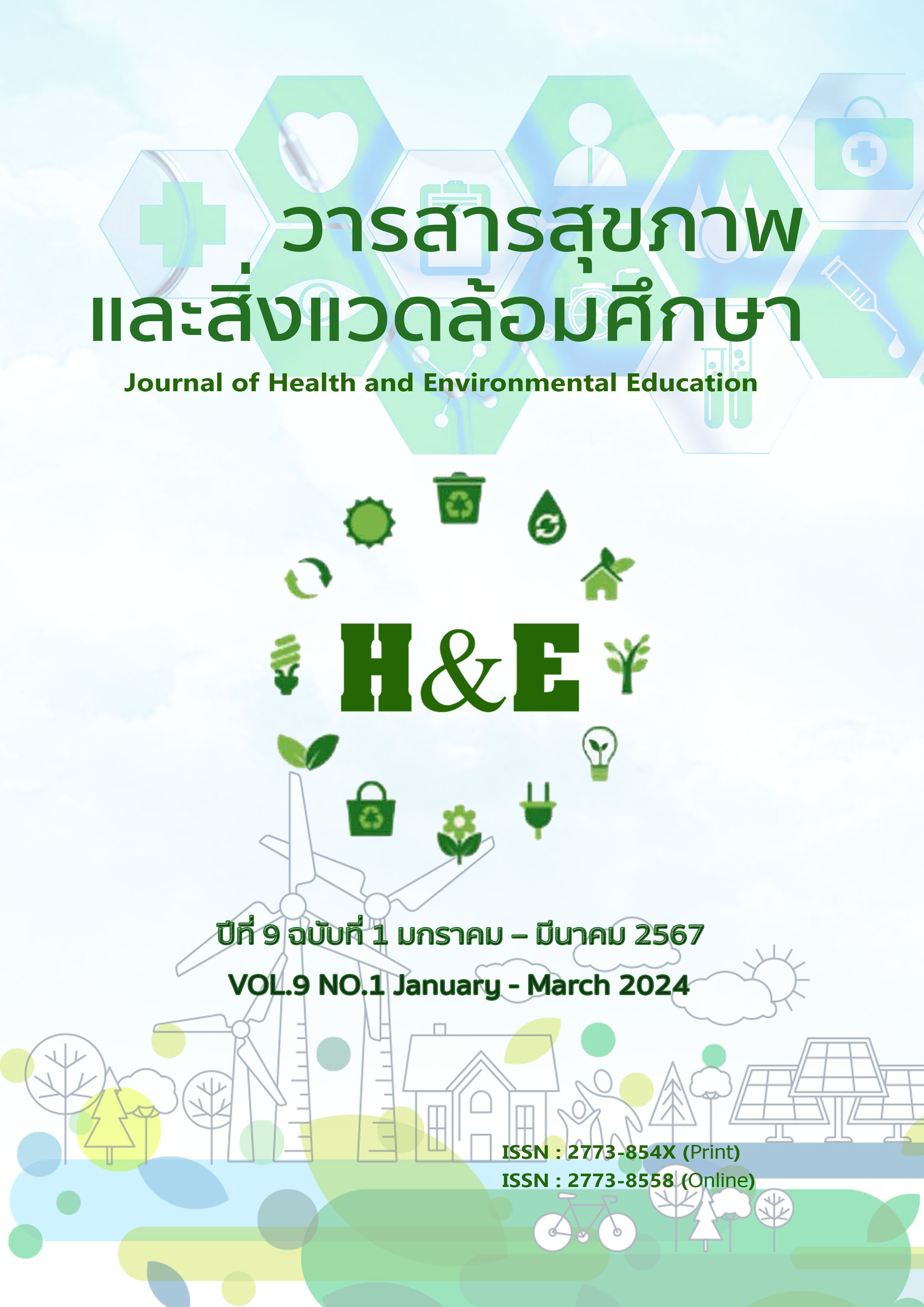ผลลัพธ์โปรแกรมส่งเสริมความผาสุกทางจิตวิญญาณตามแนวพุทธต่อคุณภาพชีวิตและระดับความพึงพอใจทางจิตวิญญาณของผู้ดูแลผู้สูงอายุตอนต้น
คำสำคัญ:
ความผาสุกทางจิตวิญญาณ, โปรแกรม, คุณภาพชีวิต, ผู้ดูแลบทคัดย่อ
การวิจัยกึ่งทดลองมีวัตถุประสงค์เพื่อศึกษาผลผลลัพธ์โปรแกรมส่งเสริมความผาสุกทางจิตวิญญาณตามแนวพุทธต่อคุณภาพชีวิตและระดับความพึงพอใจทางจิตวิญญาณของผู้ดูแลผู้สูงอายุตอนต้น กลุ่มตัวอย่างคือผู้ดูแลผู้สูงอายุตอนต้น ตำบลอาจสามารถ จำนวน 70 คน สุ่มอย่างง่ายเลือกแบ่งเป็นกลุ่มตัวอย่าง 35 คน และกลุ่มทดลอง 35 คน เครื่องมือประกอบด้วย 1) แบบสอบถามข้อมูลส่วนบุคคลเป็นแบบตรวจสอบ 2) แบบสอบถามความรู้ เรื่องการทำกิจวัตรทางศาสนากับ การนั่งสมาธิ เดินจงกรม 3) แบบสอบถามความเครียดโดยใช้แบบวัดความเครียดสวนปรุง 4) แบบสอบถามคุณภาพชีวิตของของ องค์การอนามัยโลก ชุดย่อ ฉบับภาษาไทย (WHOQOL-BREF) และ 5) แบบสอบถามความพึงพอใจทางจิตวิญญาณ วิเคราะห์ข้อมูล สถิติเชิงพรรณนา นำเสนอด้วยความถี่ ร้อยละ ข้อมูล ค่าเฉลี่ย ส่วนเบี่ยงเบนมาตรฐาน และข้อมูลสถิติเชิงอนุมานเปรียบเทียบค่าเฉลี่ยคะแนนความเครียด ความพึงพอใจทางจิตวิญญาณ และคุณภาพชีวิต นำเสนอด้วยค่า Independent t-test และ paired t-test
ผลการวิจัย ประสิทธิผลของโปรแกรมระหว่างกลุ่มทดลองและกลุ่มควบคุม พบว่าความพึงพอใจทางจิตวิญญาณ ความเครียด และคุณภาพชีวิต ระหว่างกลุ่มทดลองและกลุ่มควบคุม แตกต่างกันอย่างมีนัยสำคัญทางสถิติที่ระดับ .001 และพบว่ากลุ่มทดลองมีความพึงพอทางจิตวิญญาณเพิ่มขึ้นหลังให้โปรแกรม คะแนนความเครียดลดลงหลังให้โปรแกรม และมีคะแนนคุณภาพชีวิตเพิ่มขึ้นหลังให้โปรแกรมและ อย่างมีนัยสำคัญทางสถิติที่ระดับ .05
เอกสารอ้างอิง
Chirico F. Spiritual well-being in the 21st century: It’s time to review the current WHO’s health definition. Journal of Health and Social Sciences. 2016;1(1):11-6.
National Health Commission Office. National Health Act, B.E. 2550 (2007). 2nd ed. Nontaburi, Thailand: Sahaphattanaphaisarn Limited Partnership; 2007. (in Thai)
O’Brien ME. The need for spiritual integrity. In: Yura H, Walsh M, editors. Human needs and the nursing process. Norwalk, CT: Appleton- Century-Crofts; 2011. P. 82-115.
Chaiyasit Y, Prapassorn K, Thong-on R, Kaewkerd O. Conceptual analysis of spiritual oppression. Journal of Thailand Nursing and Midwifery Council. 2021;36(2):5-17. (in Thai)
MauK LK. Gerontological nursing: Competencies for care. 3rd ed. Burlington, MA: Jones & Bartlett; 2014.
Charoenwong S, Kongkun P, Chansangrat N, Sriwan P. Dependent elders in a Southern rural Muslim community: Current situation of care and for long-term care. The Southern College Network Journal of Nursing and Public Health. 2018;5(2):231-46. (in Thai)
Puttummavong N. Ageism towards older adults in families: A mixed methods research [Dissertation]. Bangkok, Thailand: Srinakharinwirot University; 2020. (in Thai)
Türkben PH, Kiyak S. Spiritual well-being and care burden in caregivers of patients with breast cancer in Turkey. Journal of Religion and Health. 2023;62(3):1950-63.
Young, S. M. (2023). The influence of spirituality on caregiver burden and quality of life in older adult informal caregivers [Dissertation]. Morgantown, West Virginia: West Virginia University; 2023.
Spatuzzi R, Giulietti MV, Ricciuti M, Merico F, Fabbietti P, Raucci L, Bilancia D, Cormio C, Vespa A. Exploring the associations between spiritual well-being, burden, and quality of life in family caregivers of cancer patients. Palliative & Supportive Care. 2019;17(3):294-9.
Yeh PM, Bull M. Influences of spiritual well-being and coping on mental health of family caregivers for elders. Research in Gerontological Nursing. 2009;2(3):173-81.
Mahaton H, Taephant N, Relationship among mindfulness, spiritual well-being, acceptance, and psychological distress in family caregiver of chronic non-communicable disease patients (NCDS). Academic Psychiatry and Psychology Journal. 2021;37(1):17-30. (in Thai)
Baumgardner ML, Mayo AM. The lived experience of spiritual well-being amongst family caregivers of persons with dementia on palliative care. Geriatric Nursing. 2021;42(1):65-71.
Kim SS, Hayward RD, Kang Y. Psychological, physical, social, and spiritual well-being similarities between Korean older adults and family caregivers. Geriatric Nursing. 2013;34(1):35-40.
Department of Mental Health. Training manual for the program to strengthen the spirits of relatives who care for elderly people who are stuck at home or bedridden. 2nd ed. Nontaburi, Thailand: Department of Mental Health; 2019. (in Thai)
Khemaweero PW, Pattanasing T, Khankaew T, Khumtua K, Lapontan S. Enhancement of elder people’s spiritual well-being according to Buddhism doctrines. Journal of MCU Peace Studies. 2017;5(1): 78-88. (in Thai)
Mahatnanirakul S, Tantipiwattanaskul W, Pumpaisalchai W, Wongsuwan K, Pornmanajirangul R. Comparison of World Health Organization quality of life scales. Every 100 indicators and 26 indicators. Chiang Mai: Suan Prung Hospital Chiang Mai Province, Thailand; 1997. (in Thai)
Saengthongdee J. A spiritual well-being care-taking program of relatives of end-stage cancer patients base on buddhist psychology. JSBA 2020;5(4):36-350. (in Thai)
Department of Mental Health. Assessment and analysis development research report. Stress too self for Thai citizens with a computer. 2nd ed. Samut Prakan: TCOM; 1999. (in Thai)
Chaiyasit, Y., Kunakote, N., Kotta, P., Chanbunlawat, K., & Piboonrungroj, P. (2020). Predicting factors of spiritual well-being among people living with HIV/AIDS. The
Kloadee J, Naksuwan S, Sukmaitri C. Factors affecting quality of life. (in Thai) of the elderly in Nakhon Si Thammarat Province. Rajapruek Journal. 2017;15(1): 27-32.
Sasawad K. (2017). Factors affecting the quality of life of the elderly in the eastern provinces. News Research Community.2017;11(2): 21-38. (in Thai).





